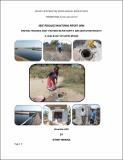Debt Resource Monitoring Report (DRM)

View/
Date
2010-11Author
Mwansa, Sydney
Type
Technical ReportLanguage
enItem Usage Stats
59
views
views
132
downloads
downloads
Abstract
The poor water supply and sanitation situation in the Central Province resulted the Zambian government to acquire a loan and grant amounting to US$33 million from the African Development Bank (AfDB) to embark on a US$36.9 million project aimed at improving the quality and delivery of water supply and sanitation services in eight project centres in Central Province. The purpose of this study is to monitor the implementation and impact of the Central Province Water and Sanitation project and assess the necessity of contracting the loan for carrying out the project in Central Province. Previous resource monitoring reports show that substantial amounts of financial resources were directed towards debt servicing at the expense of social service expenditure and national development. The dominant explanation that the country is likely to fall back into the debt trap is due to the lack of a legal framework that provides approval or oversight to loan contraction and debt sustainability. Kapiri Mposhi was chosen as the district of study, desk research, stakeholder consultation, site inspection, Focus Group Discussions (FGDs) and household questionnaires were used for data collection. Using a qualitative analysis, the study used FGDs minutes to analyse the data and in writing the report. Despite investment through the project into water supply and construction of Mushimbili dam, the majority of the residents still have no access to safe drinking water as they still rely on the water wells and streams. This is because, most residents have not been able to connect to the water supply system due to high cost of connection. The study also found that the sanitation component of the project has thus had no impact even after completion of pipe laying. The project did not include connection of the lines to the houses and the residents have not taken up the responsibility of having their houses connected due to the high cost of connection. The project has also not done well in the provision of basic sanitation services through the VIP latrines in the district. To achieve the set objectives, the government through the implementing agency, need to work with all the stakeholders to ensure the gaps identified are sealed. A lot thus still needs to be done if the project is to have any meaningful impact on the lives of the residents of Kapiri Mposhi in as far as access to safe water and sanitation is concerned.
Description
Water and Sanitation is so important that it has been recognised as a human right by the United Nations and is the 10th target of Goal 7 of the Millennium Development Goals. Improving Water and Sanitation is cardinal in uplifting the living conditions as well as the dignity of the Zambian people, achieving the MDGs and in the development of the country as a whole. The Zambian government through a US$36.9 million water and sanitation project financed in large part by the African Development Bank (AfDB) through a loan and grant amounting to US$33 million embarked on the Central Province Eight Centres Water Supply and Sanitation Project. The project is aimed at improving the quality and delivery of water supply and sanitation services in eight project centres in Central Province. This is in response to the poor water supply and sanitation situation and in line with Government strategy of promoting access to water and sanitation services as a means of reducing poverty and improving the quality of service delivery. This report monitors the implementation and impact of this project. It further offers recommendations on what can be done to ensure improved transparency and accountability in acquiring debt and in managing debt resources so as to avoid another debt trap as well as ensuring that the country borrows for the right reasons.Citation
Mwansa, S. (2010). Debt Resource Monitoring Report (DRM); Central Province Eight Centres Water Supply and Sanitation Project: A Case Study of Kapiri Mposhi. Lusaka, Zambia. Jesuit Centre for Theological Reflection (JCTR).Publisher
Jesuit Centre for Theological ReflectionCollections
- Advocacy on Debt [4]
